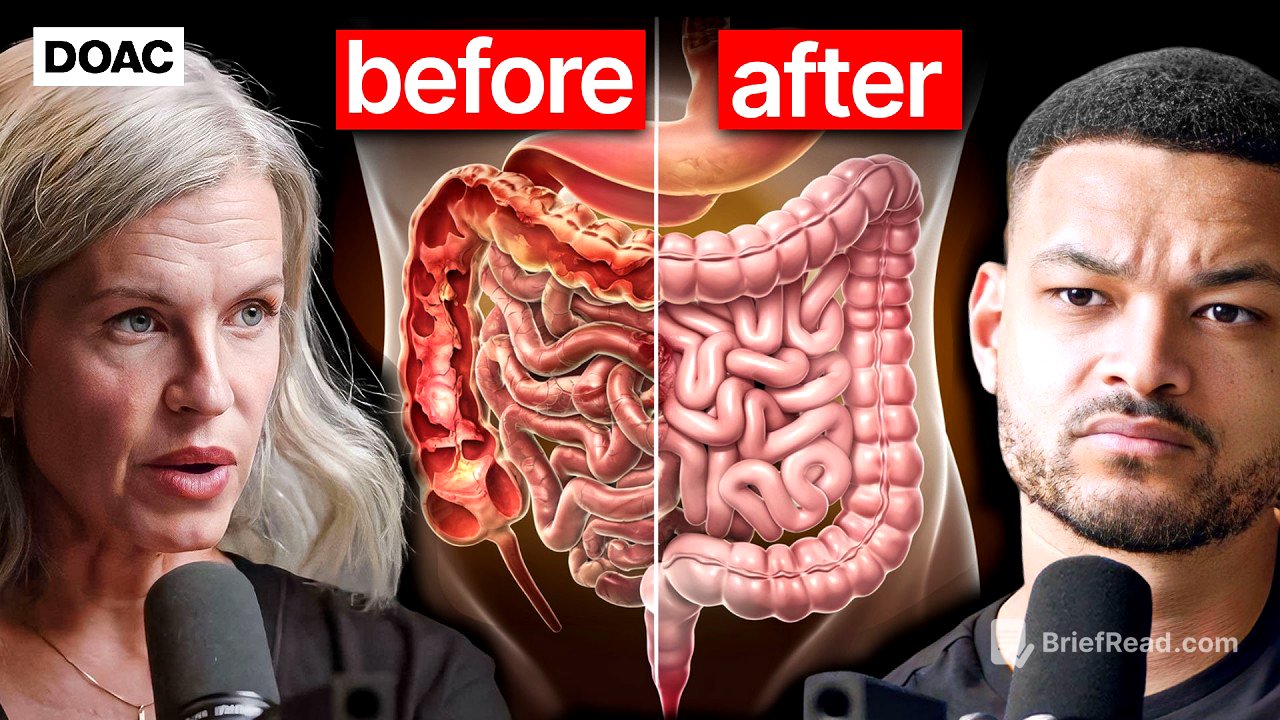TLDR;
Dr. Tina Moore, a naturopathic physician and chiropractor, discusses her mission to treat the root causes of lifestyle-induced diseases using a combination of natural medicine and pharmaceuticals. She advocates for microdosing Ozempic (semaglutide) to address metabolic dysfunction, neuroinflammation, and various health issues beyond weight loss. She shares surprising case studies, including her mother's recovery from Crohn's disease and her own experience with psoriatic arthritis. Dr. Moore emphasises the importance of lifestyle interventions, such as strength training, proper nutrition, and mindset, alongside pharmaceutical interventions.
- Naturopathic medicine focuses on treating the individual and addressing the root cause of symptoms.
- Metabolic dysfunction is a key driver of many modern diseases.
- Microdosing Ozempic can have regenerative, anti-inflammatory, and immune-boosting effects.
- Lifestyle interventions are crucial for optimising health and preventing disease.
Intro [0:00]
Dr Tina Moore's groundbreaking work combats major diseases and medical conditions. Despite the negative perception of Ozempic, when used correctly, it offers mind-blowing healing and can reverse type 1 diabetes, Parkinson's, and Alzheimer's. Studies show positive impacts on depression, anxiety, and potentially reducing cancer risks. It also improves the gut microbiome and reverses PCOS symptoms, a major cause of infertility. Dr. Moore emphasises the importance of addressing the chemical storm in our food supply and toxic chemicals in beauty habits, which disrupt the microbiome.
What Is Tina's Mission? [2:06]
Dr. Tina Moore is a naturopathic physician and chiropractor trained in root cause medicine. She aims to restore homeostasis by understanding why symptoms occur, focusing on metabolic health as a key driver of lifestyle-induced diseases. She carries on the work of her mentor, who was often ostracised for being ahead of his time in recognising the importance of metabolic health.
What Is a Naturopathic Doctor? [3:33]
A traditional allopathic physician (MD) is trained to find disease processes and prescribe treatments based on a standard of care. Naturopathic medicine, originating from old-timey European MDs, focuses on bolstering health by understanding the individual and optimising their overall health. Naturopathic doctors treat people, not diseases, aiming to optimise health so symptoms fall away, unlike allopathic medicine's focus on diagnosing and prescribing pills.
What Is Metabolic Dysfunction? [5:13]
Dr. Moore's practice specialises in muscular skeletal medicine, using Prolotherapy and regenerative injection therapies. However, she emphasises the importance of optimising a patient's overall health, including hormones, nutrition, and lifestyle, to create a healing state before applying treatments. Metabolic dysfunction, where the body cannot properly assimilate proteins, fats, and carbohydrates, is a key issue, leading to insulin resistance and type 2 diabetes. Naturopathic medicine and preventative functional medicine aim to optimise a person's resilience and immune system function to prevent this cellular disaster.
Tina's Most Surprising Case Studies [10:17]
In 2019, Dr. Moore's mother developed Crohn's disease, a condition that had affected several family members. Dr. Moore intervened with regenerative substances to pull her out of the acute phase, avoiding a colonoscopy that could have been fatal. Her mother stabilised and expressed gratitude, stating that Dr. Moore's knowledge was worth every penny of her student loan debt. This experience marked the end of Dr. Moore's high-volume clinical career, reinforcing the value of her expertise in saving her mother's life.
What Treatment Did You Prescribe Your Mother? [12:45]
Dr. Moore's mother presented as super gray and thin, with hair falling out due to Crohn's disease. After initial treatment, she was managed by another naturopathic physician and put on expensive medication from Canada. Later, Dr. Moore put her on a tiny droplet of semaglutide (Ozempic), which led to phenomenal improvements: joint pain disappeared, gut function normalised, cognition improved, and she regained her colour and weight. This experience solidified Dr. Moore's belief in the benefits of microdosing Ozempic, despite any negative perceptions.
Tina's Health History [15:47]
Dr. Moore shares her lifelong struggles with stomach aches, anxiety, and chronic pain, which began in her teenage years. She experienced severe depression and suicidal thoughts, possibly triggered by a lack of light after moving to Oregon. She later discovered she had psoriatic arthritis, leading her to research anything that would calm neural inflammation. This journey led her to glp1 agonists, like Ozempic, which she found to have unexpected benefits.
Discovering Ozempic [19:28]
Dr. Moore spent much of 2021 in chronic pain, leading to a breaking point where she contemplated suicide. After breaking out with psoriasis, she realised she had psoriatic arthritis and began researching glp1 agonists for their anti-inflammatory effects. Despite initial reservations about weight loss drugs, she was compelled to investigate Ozempic after her podcast producer suggested an episode on it.
What Is Ozempic? [27:57]
Ozempic is a peptide, part of a family of incretin peptides, designed to be more effective with fewer side effects and a longer half-life. These peptides work on appetite, metabolic health, insulin secretion, and insulin sensitivity. Dr. Moore explains that Ozempic is not causing the gut to release glp1, but it is the glp1.
Tina's Use of Ozempic [32:14]
Dr. Moore obtained a compounded version of semaglutide because she believed the standard starting dose was too high, especially for someone metabolically optimised. She started herself on a tiny dose and experienced brain clarity within days, reduced anxiety, and significant pain reduction within two weeks. This led her to use it on patients, observing similar positive responses beyond weight loss.
The Untold Story of Ozempic [38:17]
Dr. Moore believes that glp1 agonists are healing, anti-inflammatory, and regenerative, positively impacting the immune system and healing metabolic dysfunction. She has seen this in her patients and experienced it herself, being able to go off the medication for extended periods without symptoms. She cycles it like a hormone to prevent receptor saturation, suggesting that these peptides can heal chronic lifestyle diseases and reduce the need for lifelong pharmaceuticals.
Other Benefits of Ozempic [41:26]
Dr. Moore highlights the neuro-regenerative properties of glp1 agonists, which induce neuroplasticity, offering a window of opportunity for individuals to implement positive lifestyle habits. She cites studies showing improvements in cardiovascular tissue, regeneration of pancreatic tissue in type 1 diabetics, and reversal of chronic kidney disease. These agonists are also regenerative to muscle, bone, and joints, improving blood supply and inducing muscle protein synthesis.
Ozempic the Cancer Cure? [50:36]
A 2024 study found that diabetic patients taking Ozempic were 50% less likely to develop bowel cancer compared to those on insulin. Dr. Moore explains that insulin is a progrowth hormone, and being on insulin may make individuals more vulnerable to cancer. Other data sets show positive impacts on potentially reducing cancer risk, particularly obesity-related cancers. Glp1 receptors throughout the body contribute to an overall immunologic environment that is potentially anti-cancer.
Mental Health Connections to Ozempic [54:45]
While some express concerns about Ozempic inducing suicidal ideation, Dr. Moore notes that rapid weight loss can cause various issues, including depression. However, she has seen profound benefits in anxiety, depression, mood, and cognition with correct usage. She believes the anti-inflammatory mechanism and impact on dopamine pathways contribute to these positive mental health outcomes, as an inflamed brain is often a depressed brain.
Sexual Health and Fertility Impact [57:14]
Dr. Moore addresses the fertility crisis, attributing it largely to metabolic dysfunction. She notes that glp1 agonists can heal metabolic dysfunction, leading to reversal of PCOS, a major driver of infertility in young women. She expresses concern about the epigenetic flagging of offspring born to mothers with metabolic dysfunction, perpetuating a cycle of obesity and metabolic issues.
Where Is Metabolic Dysfunction Coming From? [1:00:58]
Metabolic dysfunction stems from a significantly adulterated food supply, toxicity from chemicals in food and beauty products, and a general lack of essential nutrients. Dr. Moore believes that humans are eating a chemical storm of a food supply, leading to a toxic bucket that overflows and results in metabolic dysfunction. She emphasises the importance of strength training, walking, community, and a healthy microbiome to combat these issues.
What Advice You'd Give Someone With PCOS [1:05:04]
For a young woman with PCOS impacting fertility, Dr. Moore advises prioritising protein intake (30 grams three times a day), cutting out chemicals from beauty routines, walking three times a day for 10 minutes to set the circadian rhythm, and engaging in strength training. She also suggests considering progesterone under professional guidance and eating a whole food diet. Dr. Moore believes PCOS can be reversed by addressing the environmental factors that trigger genetic predispositions.
Microdosing Examples [1:10:13]
Dr. Moore explains that she is quite surprised to hear her talk about micro doing on a zenek. She says that it's a peptide and it's been appropriated by the pharmaceutical industry because of its delivery system. She also says that there are many other peptides that are available over the counter for instance in supplement form like bpc157 which is a regenerative peptide it's also anti-inflammatory.
Microdosing Ozempic [1:15:07]
Dr. Moore demonstrates the difference between standard Ozempic dosages and her microdosing approach. Standard treatment starts at 0.25 milligrams per week, doubling every month to 2.5 milligrams over 16 weeks, and is intended for lifelong use. In contrast, Dr. Moore uses a fraction of the 0.25 milligram starting dose, depending on the patient, and may never increase it. She emphasises that she never uses semaglutide as a monotherapy, but as part of a comprehensive treatment plan.
Is Ozempic a Cure for Addiction? [1:20:34]
Dr. Moore discusses the potential of glp1 agonists in treating addictions, noting that people want to stop smoking, using cocaine, and other addictive behaviours. She cites studies showing that these agonists can reduce the seeking of pleasure foods and other unhealthy habits. She believes they impact dopaminergic pathways, helping individuals regain control over their choices and behaviours.
Ozempic and the Dopamine Pathways [1:23:56]
Dr. Moore explains that glp1 agonists impact dopaminergic pathways, which are central to the addiction system. She notes that dopamine is healthiest when seeking out a challenge, not when achieving a goal. These agonists quiet the "food noise" and hedonic urges, giving individuals control over their eating habits. They harmonise the orchestra of appetite-regulating hormones, requiring a holistic approach rather than a monotherapy.
Should We Be Concerned About Side Effects? [1:27:34]
Dr. Moore addresses concerns about the safety of microdosing Ozempic, arguing that high doses are more concerning. She notes that recent data refutes many past concerns, with no significant signal on pancreatitis or bowel obstruction. She acknowledges the risk of biliary disease but believes it is primarily associated with severe caloric restriction. She advocates for close monitoring and a risk-reward assessment, believing the benefits of microdosing outweigh the risks of chronic inflammation and related conditions.
What Are the Downsides of the Treatment? [1:30:18]
Dr. Moore acknowledges that there is no such thing as a free lunch and that there is always a cost. She says that you have to think about the risk reward ratio and that's something that we don't talk about in medicine. She says that the risk that she's seeing in the data from high doses of this is probably not nearly the risk of a tiny dose of it and it certainly is better than the clinical outcomes of walking around with raging psoriatic arthritis for the next 30 40 years which is dementia my spine fusing lack of movement muscle wasting chronic pain so on and so forth the real risk of obesity is tremendous.
What Else You Need to Do for Weight Loss if Microdosing [1:32:42]
Dr. Moore emphasises the importance of strength training, prioritising protein, and choosing nutritionally dense foods. She advises against simply taking away foods, but rather focusing on adding beneficial elements to the diet. She also recommends three 10-minute walks a day, ideally in the morning, at noon, and in the late afternoon, to optimise circadian rhythm and overall health.
Losing Muscle as We Age, Fact? [1:35:30]
Dr. Moore cites a study showing that strength training alone can lead to fat loss, muscle gain, and decreased insulin resistance. She emphasises that muscle loss is not an inevitable part of aging and that individuals in their 70s can maintain and build muscle. She encourages everyone to engage in strength training, regardless of age or gender.
The Sleep Component [1:36:37]
Dr. Moore stresses the importance of prioritising and protecting sleep. She advises addressing factors that disrupt sleep, such as snoring partners, noisy environments, and bright lights. She recommends basic sleep hygiene, such as removing TVs from the bedroom and establishing a consistent sleep schedule. She also notes that exercise and morning sunlight are critical for improving sleep.
Mindset for Weight Loss [1:38:44]
Dr. Moore emphasises the importance of a winner's mindset and goal orientation. She encourages individuals to focus on short-term and long-term goals, recognising that the journey is more important than the destination. She believes that a positive mindset is essential for making lasting changes and attracting positive outcomes.
The Benefits of Saunas [1:40:36]
Dr. Moore highlights the benefits of saunas, noting that getting hot induces heat shock proteins, which have a positive impact on the immune system. She recommends saunas as a way to improve overall health and well-being, especially during times of immune system flare-ups.
What Would Tyna Say to the World? [1:42:34]
Dr. Moore urges everyone to seek knowledge, be open-minded, and double-check information from various sources. She encourages individuals to take responsibility for their health and make small, sustainable changes to improve their well-being. She believes that routine and habit are key to long-term success.
How to Find Out More About Tyna's Work [1:46:57]
Dr. Moore advises finding a doctor who is willing to work with you and at the very least consider the starting dose that is in the pre-filled pens and talk to your doctor about not escalating so quickly and making sure that you implement the other lifestyle factors aggressively so that you don't have to increase the dosage.
Guest's Last Question [1:54:06]
Dr. Moore reflects on her life's work, expressing pride in her dedication to helping people and sharing knowledge, even when facing pushback. She acknowledges the challenges of her chosen path but finds joy in knowing that she has made a positive impact on many lives. She wants to be of service as best she can and her gift is taking complicated information and explaining it simplistically so that people can implement.









